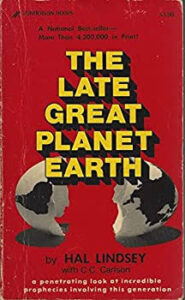 Stacie Grahn
Stacie Grahn Posted on 04/19/2023 5:59:00 AM PDT by Cronos
When a pandemic caused shutdowns across the globe in March 2020, Stacie Grahn thought it was the literal end of the world.  Stacie Grahn
Stacie Grahn
“I thought: ‘This is it. We’re all in our homes. Is this when we’re all going to disappear?’” Grahn said in a phone call from British Columbia. “With the vaccine, I thought: ‘Is this how they’re going to separate us? Is this going to be the mark of the beast we have to take?’”
For those like Grahn who are taught the rapture can happen at any second, the End Times are more than fodder for apocalyptic fiction. Fear-saturated stories about the saved being transported to heaven while the world faces havoc and hellfire can generate lifelong panic, paranoia and anxiety, reorienting people’s lives around what’s to come instead of what is.
These religious beliefs have societal implications, too. Why care about the refugee crisis or climate change if the world is doomed?
Belief in the Second Coming of Christ is as old as the church, but the concept of the rapture is a relatively recent early 19th-century phenomenon, most often embraced in evangelical or fundamentalist circles.

In the late 20th century, it was reinforced through popular media, including Hal Lindsay’s 1970 bestseller The Late Great Planet Earth, which interpreted world events as signs of the end times, as well as the 1972 thriller A Thief in the Night and, in the 1990s, Tim LaHaye and Jerry B. Jenkins’ wildly popular Left Behind series.
But, as Grahn could tell you, these ideas aren’t relics of the past. Grahn’s grandmother first introduced her to the rapture at a young age via videos of End Times ministries and preachers like JD Farag. Anything her grandmother planned was with an asterisk.
“We can plan that, but the Lord could be coming back,” Grahn recalled her grandmother saying.
Unlike Grahn, Nikki G, 46, came to view the rapture as gospel later in life. In 2010, she uprooted her life to join the International House of Prayer in Kansas City, Mo. As a survivor of several high-control religious groups. she asked to go by her first name due to safety concerns.
Nikki was attracted by the fervency of the group, which has been hosting 24/7 worship and prayer since 1999 and has a distinct End Times flavor.
“We believe that the church will go through the Great Tribulation with great power and victory and will only be raptured at the end of the Great Tribulation. No one can know with certainty the timing of the Lord’s return,” the organization’s website says.
As a result of the apocalyptic messaging she heard in these groups, Nikki said she rejected materialism, began canning food and strategized survival tactics. But prepping to survive until the rapture took a toll on Nikki.
“It’s very dehumanizing,” Nikki said. “You’re not present. You’re always in the future. You are disassociated from your body, your nervous system and yourself, and ultimately you become the theology. … I was no longer Nikki, when I was in all of that.”
She experienced nightmares, flashbacks and insomnia years after leaving.
Therapist Mark Gregory Karris said, while there’s little research on rapture-related trauma, anecdotal evidence suggests people can experience anxiety, fear and disrupted life plans because of such teachings. He said it especially is true among those who emphasize the immediacy of the rapture, the torment of those left behind and the need to be good enough to win God’s approval. Some who ingest these beliefs see future plans as futile, even faithless.
That was the case for Diana Frazier, 39, who grew up in an Assemblies of God church in Poulsbo, Wash.
“I remember sobbing multiple times as a little kid, thinking I will never get to get married, I will never get to have children. There’s no point in having any kind of dream for my future because I’ll be in heaven,” she said. “And then I would have guilt and shame, even as a little kid, because I’d know I was supposed to be happy about that.”
As a teen, Frazier participated in a youth group-sponsored hell house, a riff on haunted houses that portrayed sinful scenarios—like drunken car crashes and an abortion clinic—that led to hell.
Afterward, participants were invited to say the “sinner’s prayer.” Inundated with images of the terror she’d face if she wasn’t chosen by God, Frazier constantly was vigilant, ready to respond to disaster. But there was a cost.
“Humans aren’t meant to survive like that. Walking around with a fire extinguisher going all the time when there’s no fire is exhausting.”
Frazier paused her education after receiving her associate degree, in part because she thought Jesus would arrive at any time. Even when she had doubts, the risk of leaving her church community felt too high. She’d be forsaking her friends, her family and, later, as a parent, potentially jeopardizing her kids’ salvation.
“I’d be literally losing everything, for what? To go to college? Get a career?” she asked.

“Left Behind” movie poster, photo courtesy of Stoney Lake Entertainment.
April Sochia, 41, grew up in a Baptist community in the Adirondack Mountains of New York state and began to fear the rapture after reading the Left Behind series in college.
“I felt great pressure to force my kids to say the sinner’s prayer, because it was their ticket to heaven,” she said. “If the rapture happened, they had to say the sinner’s prayer, but it had to be genuine enough so they wouldn’t get left behind.”
According to Nikki, who now works as a certified trauma recovery coach, it’s common for people who believe in the rapture to evaluate and judge themselves constantly, seeking to be right with God so they won’t be judged harshly in the end times.
Andrew Pledger, 23, was part of the Independent Fundamental Baptist movement as a child in Walkertown, N.C., when his 4-H Club took a field trip to a local farm. Before the farm tour started, Pledger went to the bathroom. When he came out, no one was there.
“I remember just dread and fear going throughout all of me,” he said. “I couldn’t hear anyone’s voices, they were just gone. I remember running around the yard screaming and yelling for my mother … those five minutes of that fear and rapture anxiety, it was a lot.”
Though Pledger no longer believes in the rapture, his body remembers. Just over a month ago, a plane flew low over his current home in Greenville, S.C., and the sound—so familiar in the rapture genre—shocked him into fight or flight mode.
“It’s so frustrating, the cognitive dissonance of, I don’t believe in the rapture anymore, but I experienced that,” he told RNS.
Therapist Karris said much like people experience phantom limbs, people can experience “phantom ideas” even after rejecting the idea of the rapture.
“That’s why it lasts so long, because we’re talking about it being in the tracks of the nervous system,” he said.
Of course, belief in the rapture doesn’t always translate into trauma. For some, the promise of being chosen by God and escaping the world’s troubles is profoundly reassuring.
Still, the fact that some experience severe consequences shouldn’t be downplayed, Karris asserted.
Tina Pippin, a professor of religion at Agnes Scott College in Decatur, Ga., said the rapture isn’t strictly biblical. It’s a concept that’s “read back” into New Testament passages, which get “sort of appropriated or misappropriated,” Pippin said, in Scriptures like 1 Thessalonians 4, which says that those who are “alive and are left” will “meet the Lord in the air.”
With 39 percent of American adults believing humanity is living in the end times, Pippin said, it’s important to assess the far-reaching implications of apocalyptic beliefs.
“The rapture is not just a theological position, it’s also a political one, and I think a really dangerous one,” said Pippin, who criticized those who ignore or even welcome global tragedies as precursors to Jesus’ return.
As awareness around rapture anxiety grows, many who’ve been impacted by rapture teachings are reassessing their beliefs and finding physical, emotional and spiritual healing.
During the height of the pandemic, Frazier stepped away from her church community. She still believes humans are “all divinely connected” and hopes to return to school to become a therapist.
For Grahn, the rapture panic she felt during the pandemic was the beginning of her faith unravelling. She no longer believes in the rapture and holds space for religious trauma survivors on social media through her @apostacie accounts.
Her grandmother is still awaiting a heavenly ascent.
“I wouldn’t bring it up with my grandma. … They believe, as much as we know Christmas is on Dec. 25 every year, they believe it will happen at any moment,” said Grahn. “To them, it’s heaven or hell. They’re not going to give that up or take that chance.”
For many, it is deeply appealing to think of themselves as being able to earn a place among a favored elect of true Christians destined for rapture without tribulation and exempt from end times suffering. It is like believing that you will have first class, preferred boarding for an express flight to Heaven just before the rest of struggling, doomed humanity gets hammered. Despite the sales promises though, there is no sound reason to believe that any such seating will actually be available.
Nothing even remotely suggests the private rapture that rapturists try to deduce from these verses.”
I’ve never heard anyone say that the rapture would be private or somehow hidden or concealed. Just the opposite in fact. And that is obviously the tack taken in the novels.
I don’t really have an opinion on all this.
But I would say....the most recent movie, part 2 in the series (no Nick Cage, thankfully), is quite good. It is not a caricature of anything. It’s a surprisingly good movie.
Depends how you define "generation". Through most of the 20th century, those who ascribed to this theology defined a generation as 40 years. That is why in the the hey-day of the Rapture craze, Hal Lindsay and those who more or less followed him were supremely confident that the Rapture would be in 1988. Of course that year came and went, so the only thing to do was to re-define what a generation is (along with other "sure" markers that didn't pan out). It's kind of like moving the target to accommodate ones aim.
The word rapture comes from the Latin Bible meaning lifted up. Also the word Bible or Trinity is never mentioned in the Bible.
——>I’ve never heard anyone say that the rapture would be private or somehow hidden or concealed.
They all said it.
Post 36
You must be kidding as God knows Man is corrupt so why would Man’s opinion count for anything as God is pure, his Word is pure..God sent his Son to die to save Mankind as otherwise Man would be doomed to Hell...All Man has to do is ask for Salvation otherwise man is going to Hell. God doesn’t want man to go to Hell but man is given a choice...Today so many are going to Hell that Hell is being expanded.
Not even Jesus knows the actual date, that’s a mistake many a false prophet makes. Yes, ‘a generation’ is often misinterpreted. But I’m guessing 120 years might be the upper limit.
See you in the clouds Brother!!
sorry, I’ve never heard of it till this thread. I never heard Hal Lindsey, Jerry Falwell or Tim LaHaye say it, or anyone parrotting what they heard from these “mainstreamers”.
I’ve never heard of the authors mentioned in post 36.
I’d have to say, I don’t think they are mainstream dispensationalists.
Actually, it is (but most people say those verses are concerning the second coming). When you look at the early church fathers (such as Irenaeus, a student of Polycarp who was John’s student) writings, they actually taught it. My point is, is that it is NOT a recent teaching.
How about the Jesuits who came up with it to “counter” the reformation? Because, that’s where it originated.
You left out:
1. The sacking of Rome by the Alaric & his Visigoths 24 August 410, Genseric and his Vandals 455 AD, the Ostrogoths 476 AD, Robert Guiscard and his Normans 1084 He did rescue the Pope but slaughtered and sold into slavery much of the population. & Charles V - Holy Roman Emperor (Austrians mostly!) May 1527.
2. The Plague of Justinian - 541–542 AD, with recurrences until 750. Probably was instrumental in allowing the spread of the plague of Islam which we still suffer from.
3. The volcanic winter of 536 AD was the most severe and protracted episode of climatic cooling in the Northern Hemisphere in the last 2,000 years. Called the worst year to be alive; worldwide mass starvation occurred. The volcanic winter was caused by at least three simultaneous eruptions of uncertain origin, with several possible locations proposed in various continents. It also weakened civilization and contributed to the spread of Islam.
4. Black Plagues 1 (1347 to 1351) & 2 (2 was particularly widespread in the following years: 1360–63; 1374; 1400; 1438–39; 1456–57; 1464–66; 1481–85; 1500–03; 1518–31; 1544–48; 1563–66; 1573–88; 1596–99; 1602–11; 1623–40; 1644–54; and 1664–67.
All cited by writers and religious figures of the times as being apocalyptic events!
When you dismiss the other side's POV that way, you invite them to dismiss your POV exactly the same way.
**Address the Scriptural (and historical) arguments, if you can.** Dismissing them with an ad hominem, like you did, just shows that the arguments for your position are weak and unconvincing. If they were strong and convincing, you would be convincing us with them.
We’ve been over this before. The Jesuits just endorsed a futurist view of Revelation; they had no ideas about a pre-trib rapture, or any other kind of rapture. The pre-trib rapture wasn’t a thing until the 1820’s.
Well people’s opinions today are based on Satan’s ideas for the most part and Satan is the expert at the art of confusion.
It’s historical fact. Read post 39 (not posted by me).
Not sure how any sane individual can look around and not logically believe that we are living in the End Times.
—> Dismissing them with an ad hominem,
Wouldn’t that be an ad demonem?
I have been pre-mil, and I have been post-mil. Now, I am PAN-MIL. It will all pan out in the end. Maranatha.
The Holy Spirit guides to the truth.
If folks actually read and studied their Bibles they would probably land to very similar conclusions.
They don’t, hence the confusion.
I don’t belong to a religious branch where only “leaders” can teach and preach.
Disclaimer: Opinions posted on Free Republic are those of the individual posters and do not necessarily represent the opinion of Free Republic or its management. All materials posted herein are protected by copyright law and the exemption for fair use of copyrighted works.